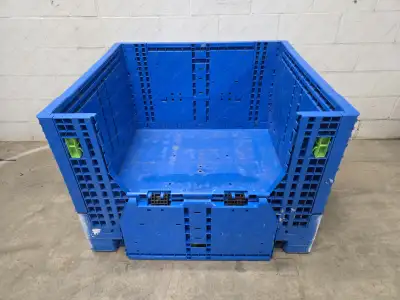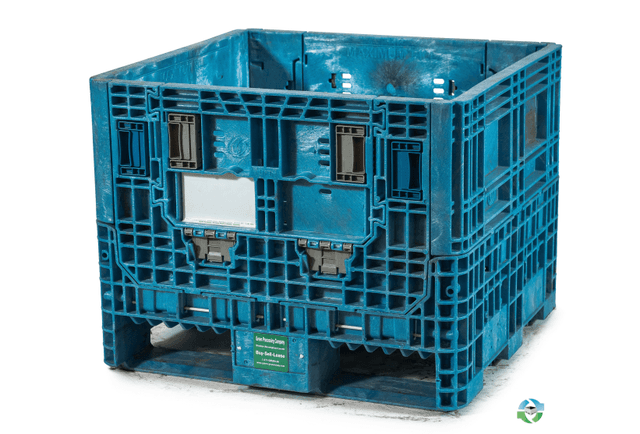Explore efficient storage ideas using refurbished bulk containers in manufacturing
The Ultimate Guide to Choosing the Right Mass Containers for Your Organization Needs
Selecting the proper bulk containers is essential for any type of business that relies upon effective logistics. Different kinds of containers exist, each made for certain materials and applications. Variables such as dimension, product compatibility, and governing requirements play a considerable role in this decision-making procedure. Recognizing these aspects can result in improved functional performance. Nonetheless, lots of services neglect important elements that could enhance their total effectiveness and sustainability. What are these considerations?
Understanding Various Types of Bulk Containers
Mass containers offer as necessary devices for companies seeking efficient storage and transportation services. These containers come in various kinds, each designed to fulfill certain operational needs. One usual type is the intermediate mass container (IBC), which is ideal for granulated and fluid materials, offering an equilibrium of capacity and ability to move. An additional preferred choice is the bulk bag, or FIBC, ideal for dry, flowable items. These versatile containers are light-weight and can be easily transferred and saved. For much heavier products, rigid mass containers are typically used, providing longevity and stability for risk-free handling. Furthermore, there are specific containers customized for dangerous materials, guaranteeing conformity with safety and security policies. Comprehending the unique qualities of these bulk container kinds enables services to make informed choices that enhance logistics and lower prices. By choosing the right container, firms can improve their operational performance and enhance their supply chain procedures.
Secret Product Considerations for Mass Containers
When selecting mass containers, it is necessary to consider the products made use of in their building. Aspects such as chemical, toughness, and longevity compatibility play a critical duty in making certain the containers satisfy particular operational needs. In addition, weight and portability problems can affect both performance and transport logistics.
Material Durability and Toughness
Resilience and stamina are crucial factors in picking products for bulk containers, as they directly affect the container's capability to withstand various environmental conditions and handling procedures. Materials such as high-density polyethylene (HDPE), polypropylene, and stainless steel are frequently preferred for their robust homes, using resistance to impact, temperature level, and abrasion changes. The selection of product also affects the overall lifespan of the container; stronger materials typically cause less constant substitutes, resulting in cost savings gradually. Additionally, the weight of the product can affect shipping expenses and convenience of handling. Companies should consider their details functional settings and the potential for deterioration to ensure peak toughness and strength in their bulk container selection.
Chemical Compatibility Elements
Recognizing chemical compatibility is essential for choosing bulk containers, as the materials made use of must withstand the particular compounds they will certainly hold. Different variables affect compatibility, consisting of the chemical nature of the materials, temperature, and duration of storage space. Harsh chemicals might require containers made from stainless steel or specialized plastics that withstand degradation. In addition, responsive compounds can produce heat or gases, demanding aired vent or pressure-rated containers. The option of container product, whether polycarbonate, polyethylene, or metal, must align with the chemical residential or commercial properties of the kept materials to stop leakages or violations. Eventually, a detailed assessment of these compatibility elements guarantees risk-free handling and storage, safeguarding both employees and the environment while preserving product integrity.
Weight and Portability Concerns
Choosing mass containers entails not only assessing chemical compatibility however also thinking about weight and mobility. Organizations have to assess the simplicity of handling and transportation to maximize efficiency. Light-weight materials like high-density polyethylene (HDPE) or light weight aluminum can assist in much easier motion and reduce delivery prices. Alternatively, heavier containers might give enhanced sturdiness but can prevent mobility, specifically in atmospheres needing constant relocation. Furthermore, the style of the container ought to enable practical training and stacking, making sure ergonomic security for employees. Companies need to likewise consider the framework readily available for transport; for instance, containers compatible with forklifts or pallet jacks can simplify operations. Eventually, the appropriate balance in between weight and transportability directly affects functional effectiveness and expense efficiency.
Sizing Your Mass Containers for Optimum Performance
When sizing bulk containers, companies need to thoroughly examine the dimensions needed to suit their details products. In addition, weight capacity is a vital aspect that affects performance and safety and security during transportation and storage space. Efficient sizing not just maximizes space but also enhances operational process.
Figuring Out Container Dimensions
Selecting the ideal measurements for mass containers is crucial for taking full advantage of performance in storage space and transportation. Organizations need to analyze their particular needs, considering aspects such as readily available area, the nature of the goods being stored, and the techniques of transportation used. Exact measurements guarantee that containers fit ideally in warehouses and lorries, reducing squandered area and minimizing handling time. Requirement dimensions can provide ease, but customized dimensions could be required for special requirements or to accommodate details items. Additionally, it is necessary to examine piling abilities and ease of access, as these factors influence overall functional effectiveness. Ultimately, the right dimensions lead to improved company and streamlined logistics, benefiting the overall efficiency of the business.
Weight Capacity Considerations
Understanding weight capability is important for businesses intending to maximize their bulk container efficiency. The weight ability of a container directly affects storage space capacities, transport logistics, and total functional prices. Selecting containers with the suitable weight restrictions guarantees that businesses can safely keep and deliver their items without risking damage or conformity problems. Straining containers can cause architectural failings, while underutilizing capacity lead to wasted sources. It is crucial for companies to examine their item weights and consider any regulative requirements when picking containers. Additionally, elements such as the sort of product, intended usage, and environmental problems ought to additionally affect weight capacity choices. By assessing these components, companies can boost effectiveness and ensure a structured supply chain.
Regulative Conformity and Safety And Security Requirements

Governing compliance and security requirements play an important function in the choice of bulk containers for organizations. Organizations has to assure that their containers satisfy numerous laws set by regional, national, and global authorities. These requirements typically refer to material security, architectural integrity, and proper labeling, which help protect against crashes and guarantee the risk-free transportation of goods.
In addition, adherence to industry-specific standards, such as those from the Fda (FDA) or the Occupational Safety and Health Administration (OSHA), is critical for business dealing with dangerous materials or food. Non-compliance can cause penalties, legal problems, or damages to a service's online reputation.
Services ought to also think about the container's compatibility with the materials being stored or moved to avoid contamination or chain reaction (refurbished bulk containers). To sum up, understanding and executing regulative compliance and safety requirements is important for the effective and accountable use mass containers
Sustainability Choices for Eco-Friendly Mass Containers

Companies are additionally discovering alternatives made from recycled products, which not just preserve resources however also sustain the reusing sector. Furthermore, technologies in style enable lighter containers that require less energy to transportation, even more improving sustainability. By integrating these environmentally friendly mass container alternatives, companies can show their dedication to ecological stewardship while satisfying customer need for lasting practices. This shift not just assists the planet yet can also boost brand reputation and consumer commitment.
Cost-Effectiveness and Budgeting for Bulk Containers
While lots of companies concentrate on sustainability, cost-effectiveness continues to be a critical variable when choosing mass containers. Organizations should analyze the first purchase cost, in addition to lasting operational prices, to ensure monetary feasibility. Aspects such as reusability, upkeep, and toughness play a considerable duty in identifying general costs.
Spending in top quality containers might generate greater ahead of time expenses but can bring about cost savings through decreased replacement prices and lowered waste. In addition, companies must consider transportation prices and storage effectiveness, as these can impact the general budget plan.

Frequently Asked Inquiries
How Do I Identify the Right Container for Hazardous Materials?
To establish the right container for unsafe more info materials, one must assess compatibility with the material, consider the container's material, check for regulative compliance, and analyze capability and safety and security features to guarantee correct handling and storage.
Can Bulk Containers Be Custom-made for Particular Products?
Yes, bulk containers can be personalized for details products. used collapsible bulk containers. Various features, such as size, design, and product, can be tailored to satisfy distinct needs, making sure excellent safety and security and performance for carrying and storing different goods
What Is the Ordinary Lifespan of Various Mass Container Kind?
The typical life expectancy of bulk container types differs; plastic containers last 5-10 years, steel containers 10-20 years, and wooden containers usually last 3-7 years, relying on use, upkeep, and ecological problems.
Exactly how Should I Tidy and Maintain Mass Containers?
To clean up and preserve bulk containers, one should consistently evaluate for damages, remove residue, clean with proper detergents, wash thoroughly, and warranty appropriate drying out before storage. Adhering to maker standards enhances long life and safety and security throughout usage.
Are There Rental Choices for Bulk Containers Available?
Yes, countless firms supply rental choices for mass containers, giving adaptability for organizations. These leasings can fit different requirements, permitting firms to take care of stock effectively without the commitment of purchasing containers outright.
Sturdiness and strength are vital factors in selecting products for bulk containers, as they directly affect the container's capability to endure various environmental problems and handling procedures. Comprehending chemical compatibility is vital for selecting bulk containers, as the products made use of should resist the specific compounds they will hold. Recognizing weight ability is important for organizations intending to maximize their mass container efficiency. Regulatory compliance and security criteria play a crucial function in the choice of mass containers for companies. While numerous organizations focus on sustainability, cost-effectiveness stays a vital factor when selecting bulk containers.